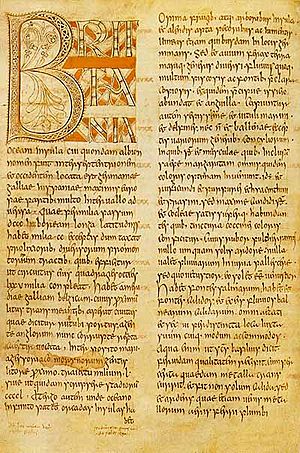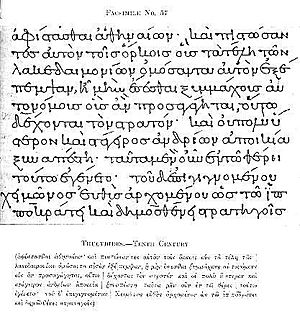Historiography facts for kids
Historiography is all about how history is written and studied. It looks at who wrote the history, what sources they used, how they understood events, their writing style, any personal opinions or biases they had, and who they were writing for. You could say it's like "the history of history." The word historiography can also mean all the historical works written on a certain topic.
Contents
How History Has Been Written
For thousands of years, people have shared stories about the past. They also made written records of important people like kings and prophets. But around 500 BC, they started writing more organized history books.
Ancient Greece: The First Historians
Written history first appeared with the ancient Greeks. Their historians really helped develop how history is studied. The very first historical works were The Histories by Herodotus of Halicarnassus (born around 484 BC). He later became known as the 'father of history'.
Thucydides was the first to clearly show the difference between why something happened and its immediate causes. His follower Xenophon (around 431–355 BC) added personal stories and studies of people's characters in his book Anabasis.
Roman Times: Expanding History
The Romans took ideas from the Greeks and were the first to write history in a language other than Greek. Famous Roman writers include Julius Caesar (100 BC–44 BC) with his book Bellum Gallicum.
Livy (59 BC–AD 17) wrote about how Rome grew from a small city-state to control a huge empire. Plutarch (around 46 - 127 AD) and Suetonius (around 69-after 130 AD) started writing biographies, which are life stories, as a type of history. Tacitus (around 56–around 117 AD) criticized Roman ways by praising the good qualities of German tribes.
History in the Middle Ages

Writing history was popular among Christian monks and church leaders in the Middle Ages. They wrote about the history of Jesus Christ, the Church, and the ruling families they supported. In the Early Middle Ages, historical writing often came in the form of annals or chronicles. These recorded events year by year. This style sometimes made it hard to deeply analyze why things happened. An example is the Anglo-Saxon Chronicle, which was written by many different people. It started during the time of Alfred the Great in the late 9th century and was updated until 1154.
During the Renaissance, history started to be written about states or nations. The way history was studied changed again during the Enlightenment and Romanticism. Voltaire wrote about specific historical periods that he thought were important, instead of just listing events in order. History then became its own separate subject. It was no longer called "philosophy of history" but simply "history."
Modern History Writing
Modern historiography began with Leopold Ranke in the 19th century. He was very strict about checking the sources used in history.
The French Annales School completely changed history in the 20th century. Fernand Braudel wanted history to be more scientific. He pushed for more mathematical evidence in history to make it less about personal opinions. He also added social, economic, and geographic ideas to help answer historical questions. Other French historians, like Philippe Ariès and Michel Foucault, wrote about everyday life topics. They believed history should cover all subjects and that all kinds of questions should be asked.
Determinism in History
Determinism is when historians believe that history is mostly caused by certain factors more than others. The two most common types are geographic determinism and economic determinism.
- Geographic determinism means historians think history is mainly shaped by geography. Frederick Jackson Turner was a supporter of this idea.
- Economic determinism means historians believe history is mostly caused by economics. Charles Beard was a supporter of this view.
Other historians might think history is mainly caused by politics or the fight for natural rights, but these ideas are usually not called "determinism."
Related Pages
Images for kids
-
The Roman bust of historian Cato the Elder.
-
First page of the Shiji, an important Chinese history book.
-
Autograph writing of Ibn Khaldun, a pioneer in writing history and understanding cultures.
-
Voltaire's history works showed how much more accurate history writing became during the Age of Enlightenment.
-
Edward Gibbon's Decline of the Roman Empire (1776) was a major history book of the late 18th century.
-
Ranke helped make history a professional academic subject in Germany.
-
Macaulay was a very influential writer of Whig history, which saw history as a story of progress.
-
The 20th century brought many new ways to study history. Marc Bloch focused on social history instead of just political history.
See also
 In Spanish: Historiografía para niños
In Spanish: Historiografía para niños
 | Mary Eliza Mahoney |
 | Susie King Taylor |
 | Ida Gray |
 | Eliza Ann Grier |














